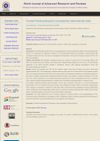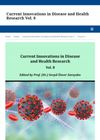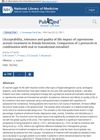Search
for
Sort by
Research
360-390 / 1000+ results
research Can You Pull It Off? Appearance Modifying Behaviors Adopted by Wig Users with Alopecia in Social Interactions
Wig users with alopecia do a lot of emotional and practical work to make their wigs look natural and manage how others see them.

research Development of the Alopecia Areata Patient Priority Outcomes Instrument: A Qualitative Study
Researchers created a new tool to measure the effects of alopecia areata from the patient's view, focusing on hair loss, daily life, and emotional health.
research A Case of Neurodermatitis Circumscripta of Scalp Presenting as Patchy Alopecia
Emotional factors are crucial in treating and preventing scalp neurodermatitis and hair loss.

research Intermittent Chronic Telogen Effluvium
Emotional stress can trigger intermittent hair loss in chronic telogen effluvium, which may not improve with treatment if stress continues.

research Management of Autoimmune-Associated Alopecia Areata
Treatments for autoimmune hair loss have limited success and often relapse, and emotional support is crucial for those affected.

research Clinical Benefits of Baricitinib Therapy for Severe Alopecia Areata
Baricitinib treatment helps regrow eyebrow, eyelash, and scalp hair in severe alopecia areata, improving patients' emotional well-being and quality of life.

research Psycho-Emotional Conditions in Patients with Non-Scarring Alopecia (Circumscribed, Androgenetic)
Patients with non-scarring hair loss often have emotional disorders.
research Psychosocial Perception of Patients with Female Androgenetic Alopecia
Female hair loss causes emotional distress and needs holistic treatment.

research Female Pattern Hair Loss: Clinical Features
Hair loss in women can be caused by genetics, menopause, certain health conditions, and emotional stress, and it often results in thinner hair and a changing hairline.
research Alopecia in the United States: Outpatient Utilization and Common Prescribing Patterns
Alopecia areata causes significant emotional distress, including high rates of depression and anxiety.
research Women Coping with Chronic Disease: The Psychosocial Impact of Lupus
Lupus causes emotional and social challenges, but support from friends helps reduce depression and anxiety.

research Practical Approach for Treatment Lines of Alopecia Areata: Review Article
The conclusion is that emotional support and a variety of treatments are important for alopecia areata, but more research is needed.

research Frontal Fibrosing Alopecia: A Prospective Observational Study
Cosmetic products or emotional factors might contribute to Frontal Fibrosing Alopecia, and trichoscopy is useful for diagnosis.

research Hair Loss Diagnosis and Treatment Knowledge-Based System
Hair loss causes emotional distress, leading to high spending on treatments, with Minoxidil and Propecia being common but having side effects.

research Hair Loss Effects and Surgical/Drug Treatments for Alopecias
Hair loss can cause emotional and social issues, and various treatments, including medication, surgery, and psychological support, are needed.
research Evaluation of the Quality of Life in Patients with Alopecia Areata and Androgenetic Alopecia
Alopecia significantly harms emotional and social well-being.

research ‘You Lose Your Hair, What’s the Big Deal?’ I Was So Embarrassed, I Was So Self-Conscious, I Was So Depressed: A Qualitative Interview Study to Understand the Psychosocial Burden of Alopecia Areata
Alopecia Areata (AA) causes significant emotional distress, including feelings of embarrassment, depression, and anxiety, and impacts social interactions and daily activities.

research Body Image, Personality Profiles, and Alexithymia in Patients with Polycystic Ovary Syndrome
Women with PCOS have more emotional and body image issues than healthy women.

research Alopecia Areata: The Clinician and Patient Voice
Alopecia areata causes unpredictable hair loss and emotional distress, with no cure and limited treatment options.

research Non-Scarring Alopecia in Females: A Comprehensive Review
Non-scarring alopecia in females affects emotional well-being and requires accurate diagnosis and personalized treatment.

research Assessment of Psychosocial Dimensions of Systemic Lupus Erythematosus: Implications for Health Care Professionals
Health care providers should address the emotional challenges of SLE patients with comprehensive care.

research Hair Loss: It's Not Just a Cosmetic Concern
Hair loss can cause significant emotional and psychological distress.

research Psychosocial Aspects of Androgenetic Alopecia
Hair loss can cause significant social and emotional issues, especially for women and young men.

research Laser Treatment for Female Facial Hirsutism: Are Quality-of-Life Benefits Sustainable?
Laser hair removal improves quality of life but emotional benefits decrease over time, suggesting more treatments are needed for lasting effects.

research Psychosocial Impairment as a Possible Cause of Sexual Dysfunction Among Young Men With Mild Androgenetic Alopecia: A Cross-Sectional Crowdsourcing Web-Based Study
Young men with mild hair loss who experience significant social and emotional distress are more likely to have sexual problems.

research Acceptability, Tolerance, and Quality of Life Impact of Cyproterone Acetate Treatment in Female Hirsutism: Comparison of Two Protocols with Oral or Transdermal Estradiol
Cyproterone acetate with estradiol improved women's self-confidence and emotional well-being without a difference between oral or transdermal methods, but younger women preferred the oral method.
research Acne
Don't ignore acne treatment to avoid scars and emotional trauma.

research Polycystic Ovary Syndrome: A Psychosocial Approach
Polycystic ovary syndrome (PCOS) significantly impacts women's emotional well-being and social lives, requiring treatments that include psychological support.
research Therapeutic Options To Refractory Alopecia Areata
Treating stubborn hair loss involves both medical and emotional support options.